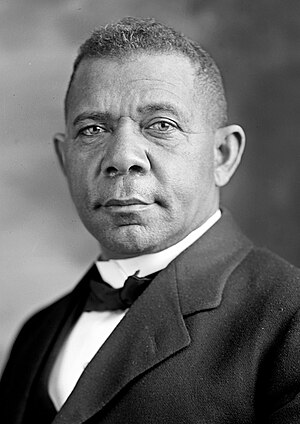 Image via WikipediaWilliam Monroe Trotter Institute Mission Statement
Image via WikipediaWilliam Monroe Trotter Institute Mission StatementWilliam Monroe Trotter, 1872-1934
William Monroe Trotter helped to found the Niagara Movement, the precursor of the NAACP, and a major milestone in the Negro Protest Movement of the twentieth century.
In March, 1901, he helped organize the Boston Literary and Historical Association, a group that became a forum for militant race opinion. Trotter became more active in discussions about race, and in November, 1901, the first issue of Trotter's newspaper The Guardian appeared, proclaiming itself an organ to voice intelligently the needs and aspirations of the colored American.
The editorials made The Guardian notorious and prompted its readers to strongly-felt opinions. Week after week, Trotter attacked the person, prestige and racial policies of Booker T. Washington. Their bitter rivalry led eventually to lawsuits and counter suits. William Monroe Trotter considered himself much more of an activist than the Bookerites who would go along with policies detrimental to Black people.
Trotter founded the Niagara Movement with W.E.B. DuBois and others. He became a critic of politicians, especially Roosevelt and Wilson. When Wilson encouraged the segregation of employees in government departments, Trotter objected. In an interview with Wilson, Trotter astonished the President by arguing with him. Trotter afterward quoted the President to the press, an action considered to be a violation of courtesy, but his action did reveal that Wilson was aware of the segregation and defended it. In 1915 Trotter organized opposition to the showing of the film Birth of A Nation at the Tremont Theater.
Trotter was the first black elected to Phi Beta Kappa at Harvard and graduated in 1895 Magna Cum Laude.
Trotter was the first black elected to Phi Beta Kappa at Harvard and graduated in 1895 Magna Cum Laude.
For the pdf version of an article on Trotter by Anthony Sammarco that appeared in the Dorchester Community News on Feb. 22, 2002 Click here.
Unlike DuBois, Trotter was the more forceful and persistent of the radicals as their opposition to Washington mounted. Trotter's approach was best exemplified in the confrontation which occurred in Boston on July 30, 1903. He proposed to use the occasion of a speech by Washington before the Boston Branch of the National Business League to ask him nine questions relating to his program and its results. As Trotter stood on a chair in an attempt to read his nine questions, he and his sister were arrested, leaving Washington free to deliver his speech. The incident was quickly labeled the "Boston riot" and received widespread coverage
Although Trotter maintained that he had not gone to the meeting for purposes of disruption, he ably accomplished his major goal of directing national attention to the fact that there were some blacks who disagreed with Washington and his program. Trotter's sentence of thirty days in jail encouraged Du Bois to join forces with him.
After the "riot," Trotter formed the Boston Suffrage League. The League was expanded into the New England Suffrage League as blacks from other areas joined. The aim of the group was to place before the American people wrongs against the claims of blacks. Trotter was elected president. He pressed for anti-lynching legislation, the expenditure of one hundred-twenty million dollars a year on southern schools until 1925, the elimination of segregation on interstate carriers and the enforcement of the Fifteenth Amendment.
 Image via Wikipedia
Image via Wikipedia
 Image via Wikipedia
Image via Wikipedia
W.E.B. Du Bois (seated), and (left to right) J.R. Clifford, L.M. Hershaw, and F.H.M. Murray at Harpers Ferry.
Unlike DuBois, Trotter was the more forceful and persistent of the radicals as their opposition to Washington mounted. Trotter's approach was best exemplified in the confrontation which occurred in Boston on July 30, 1903. He proposed to use the occasion of a speech by Washington before the Boston Branch of the National Business League to ask him nine questions relating to his program and its results. As Trotter stood on a chair in an attempt to read his nine questions, he and his sister were arrested, leaving Washington free to deliver his speech. The incident was quickly labeled the "Boston riot" and received widespread coverage
Although Trotter maintained that he had not gone to the meeting for purposes of disruption, he ably accomplished his major goal of directing national attention to the fact that there were some blacks who disagreed with Washington and his program. Trotter's sentence of thirty days in jail encouraged Du Bois to join forces with him.
After the "riot," Trotter formed the Boston Suffrage League. The League was expanded into the New England Suffrage League as blacks from other areas joined. The aim of the group was to place before the American people wrongs against the claims of blacks. Trotter was elected president. He pressed for anti-lynching legislation, the expenditure of one hundred-twenty million dollars a year on southern schools until 1925, the elimination of segregation on interstate carriers and the enforcement of the Fifteenth Amendment.
 Image via Wikipedia
Image via Wikipedia Image via Wikipedia
Image via WikipediaW.E.B. Du Bois (seated), and (left to right) J.R. Clifford, L.M. Hershaw, and F.H.M. Murray at Harpers Ferry.


No comments:
Post a Comment